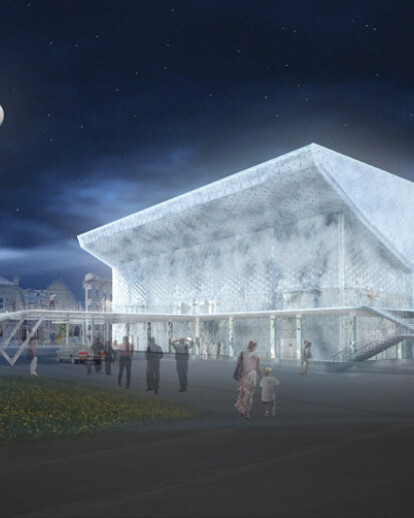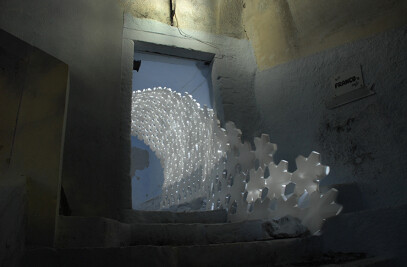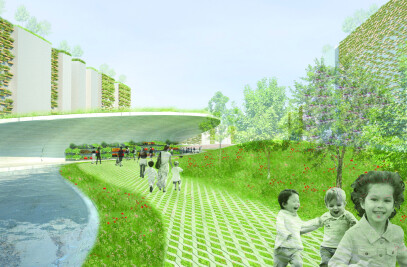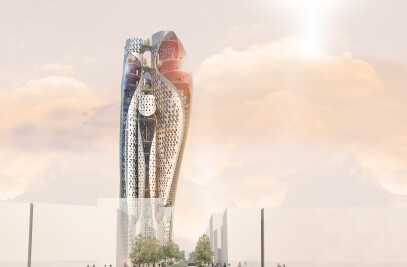Many masters of Russian cinema, from the introduction of Lumière Brothers to Russia, then Vertov, Eisenstien, Tarkovsky and Sokurov to name a few, have provided us with unimaginable vision of how our world can be seen from a different perspective. Through their evolving art of cinema, not only do its visuals stimulate us but furthermore, our subconscious creates a deeper imagination to the contents we literally experience. Cinema world allows us to explore the unknown territory that cannot be experienced in the reality. When we enter the realm of the black box and see the events that unfold in front of us caused by the bright projection, and in the most magical moments, we feel like we are participating in those fictional events. The collapse of reality and non-reality creates a metaphysical hyper reality. In this proposal, we question the current state of contemporary cinema house that conceals its facade with various movie advertisements and timetables. Understandably this attempt literally portrays the program contained within. But such what-you-see-is what-you-get approach does not stir our imagination leaving no space for wonderings and surprise. Fog Cinema proposes a façade for Pushkinsky Cinema that will be veiled by a mystical fogwall, contained by a geometrical glass panels that dynamically change its face throughout day and night. A sensation that is never provided in any cinema house will further stimulate the imagination of Muscovites and visitors of Pushkinskaya Square. The new façade implements a double skin glass wall with two types of hexagrid patterned glass system on the outer skin: operable flat glass and concave glass made of DuPont™ SentryGlas® and Butacite®. The solid side façade will be restored and coated with DuPont™ Tyvek® and PercoTop® and implemented with second layer of hexagrid glass. The new facade will feature the ever-changing visual transformations created by the fog system and the natural/artificial lighting conditions. The fog will be created within the double-skin facade with the help of spray nozzles installed throughout the fogwall. Water sources are collected via off-site and from rain water and snow on rooftop. This water will be fed through the underground water collection tank, where it will be purified and fed through the spray nozzles to create fog. The high pressure water fed throughout the fog system will transform a clear double-skin facade into a mystical sensation that temporary conceals Pushkinsky Cinema. Sprayed out water will be collected at the base of the fogwall, and will be fed back to the water purifying tank. The operable concave glass panels serve as rain and snow collectors, and after collecting certain amount of water they diagonally slide and rotate to feed the collected water within the skin to the base gutter. Some portion of the water, together with purified waste water from the building will be used for irrigating the plants of Pushkinskaya Square. The operable flat panels will open and allow fresh air inside the double skin facade to dry the glass after the fog performance is over.
Products Behind Projects
Product Spotlight
News

Fernanda Canales designs tranquil “House for the Elderly” in Sonora, Mexico
Mexican architecture studio Fernanda Canales has designed a semi-open, circular community center for... More

Australia’s first solar-powered façade completed in Melbourne
Located in Melbourne, 550 Spencer is the first building in Australia to generate its own electricity... More

SPPARC completes restoration of former Victorian-era Army & Navy Cooperative Society warehouse
In the heart of Westminster, London, the London-based architectural studio SPPARC has restored and r... More

Green patination on Kyoto coffee stand is brought about using soy sauce and chemicals
Ryohei Tanaka of Japanese architectural firm G Architects Studio designed a bijou coffee stand in Ky... More

New building in Montreal by MU Architecture tells a tale of two facades
In Montreal, Quebec, Le Petit Laurent is a newly constructed residential and commercial building tha... More

RAMSA completes Georgetown University's McCourt School of Policy, featuring unique installations by Maya Lin
Located on Georgetown University's downtown Capital Campus, the McCourt School of Policy by Robert A... More

MVRDV-designed clubhouse in shipping container supports refugees through the power of sport
MVRDV has designed a modular and multi-functional sports club in a shipping container for Amsterdam-... More

Archello Awards 2025 expands with 'Unbuilt' project awards categories
Archello is excited to introduce a new set of twelve 'Unbuilt' project awards for the Archello Award... More

























